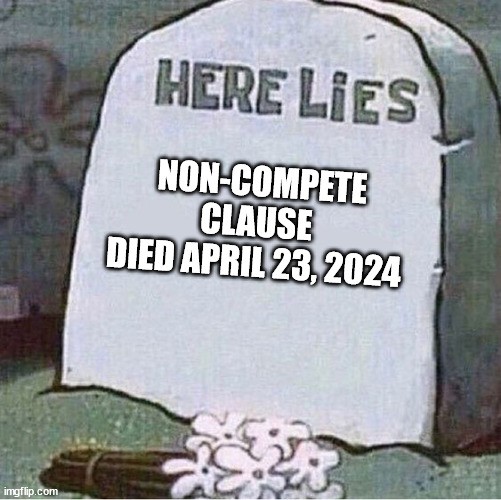This depiction may be a bit dramatic, but the employment based non-compete agreement as we know it may soon be dead. On April 23, 2024, by a vote of 3-2, the United States Federal Trade Commission (“FTC”) passed its Non-Compete Clause Rule (“Rule”), which, if it becomes law, will effectively ban most employment based non-compete agreements as an “unfair method of competition.”
The text of the Rule, despite being part of a 570-page publication, is straight forward (the Rule itself is only 8 pages) and in substantive part provides as follows:
Non-Senior Executive Employees:
All non-compete agreements with employees other than “senior executives” (a term defined in Section 910.1 of the Rule) are banned as of the effective date of the Rule. As part of this ban, Employers may not:
- Enter into or attempt to enter into a non-compete clause,
- Enforce or attempt to enforce a non-compete clause (regardless of when entered into), or
- Represent that the employee is subject to a non-compete clause.
Senior Executive Employees:
The restrictions for senior executives are generally the same as those applicable to non-senior executive employees, with the important distinction that restrictions applicable to senior executives apply only proactively. In other words, while restriction (i), above, is the same for all employees (i.e., a non-complete clause may not be entered into following the effective date of the Rule with any employee, senior executives and non-senior executives alike), restrictions (ii) and (iii), above, as applicable to senior executives, apply only to a non-compete clause that is entered into after the effective date of the Rule. Non-compete clauses with senior executives that are in effect as of the effective date of the Rule remain enforceable.
Required Notice:
For non-senior executive employees subject to a non-compete clause, the Rule requires employers to notify the employee that the non-compete clause is not enforceable. Section 910.2 of the Rule includes a form notice.
Exceptions:
There are a few exceptions to the Rule:
- Sale of Business. Non-compete clauses are still permitted in the context of the sale of a business. However, it is presently unclear whether this exception is limited to a non-compete clause in the purchase agreement or would also extend to any employment agreement entered into as part of the sale transaction.
- Existing Causes of Action. The Rule does not apply to legal claims that have accrued prior to the effective date of the Rule.
- Good Faith Belief that Rule is Inapplicable. If an employer has a good faith belief that the Rule is inapplicable to a particular non-compete clause, then it is not an unfair method of competition for that employer to enforce or attempt to enforce the non-compete clause, or to make representations about the non-compete clause.
Effective Date of the Rule:
The Rule provides that it shall become effective 120 days after its publication in the Federal Register, which is currently scheduled for May 7, 2024. Accordingly, the effective date for the Rule is currently set for September 4, 2024.
That said, there already have been, and likely will be more challenges to the Rule and the FTC’s ability to pass and enforce the same. For example, a lawsuit was filed on April 23, 2024 in the U.S. District Court for the Northern District of Texas to vacate the Rule and declare that the FTC has no authority to issue rules defining acts to be unfair methods of competition. See Ryan, LLC v. Federal Trade Commission.
What to Do:
- Connect with lawyers at Miller, Miller & Canby, who will stay apprised of any challenges to the Rule and its ultimate effective date.
- Develop a strategy in the event the Rule becomes final, including a system to implement and carry out reporting requirements.
- Develop alternate means to protect company assets, including the development of comprehensive non-solicitation and confidentiality agreements, which, provided they are not “so broad or onerous that [they have] the same function effect as” a non-compete clause, should survive scrutiny under the Rule.
How MM&C Business Attorneys Can Help:
Please contact Miller, Miller & Canby should you have any question dealing with the FTC Rule.
Kevin D’Anna is a Principal at Miller, Miller & Canby and a member of the firm’s Business & Tax and Real Estate (finance) practice groups. Kevin regularly advises local and regional businesses of varying size and industry as a trusted outside counsel, providing legal advice on business formation, mergers, acquisitions or disposition, and complex business transactions. He may be reached at kkdanna@mmcanby.com.
Scott Mirsky is a Principal in Miller, Miller & Canby’s Employment Law and Employment Litigation practice, with more than 20 years of experience representing individuals and businesses in diverse civil matters throughout the Washington, DC region. He has experience handling non-compete and trade secret disagreements, employment claims, issues concerning independent contractors, complex construction issues, wage and overtime disputes under the FLSA and state law, and breach of contract claims. To learn more about his practice, contact Scott at samirsky@mmcanby.com.








Share this Article: